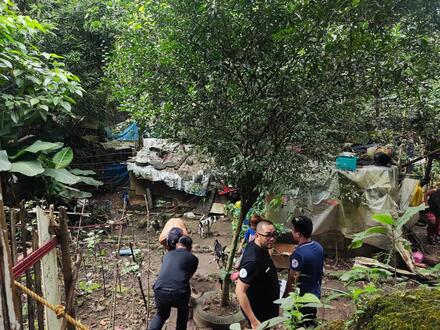Kerenza Chats with Champions: Dr. Rey Del Napoles on changing mindsets and eliminating rabies

For this edition of “Kerenza Chats with Champions”, we sat down with Dr. Rey Del Napoles, a dedicated veterinarian and rabies elimination expert from the Philippines. With decades of experience in dog population management, policy-making, and community engagement, Dr. Del Napoles is at the forefront of the fight against rabies. But beyond the science and strategies, his work reveals the powerful role of human behavior in creating lasting change.
From Psychiatry to Saving Lives — A Career in Veterinary Medicine
Dr. Del Napoles never planned to become a veterinarian. Initially, his interest lay in human medicine, specifically psychiatry. But fate had other plans. “I had no idea that the flagship program at the university I transferred to was veterinary medicine,” he laughs. “I just wanted to study science, but I ended up getting the highest entrance exam score — so, whether I liked it or not, I was in.” This unexpected turn led him to a career where he would not only treat animals but also shape national policies, including the Philippines' rabies law.
Culture and Community — Why Human Behavior is Key

In the Philippines, as in many other countries, the concept of pet ownership can be very different from Western norms. “Most dogs are not confined, they roam freely around the community,” Dr. Del Napoles explains. “People see them as natural security guards or even as garbage disposals for food scraps.” These deeply ingrained attitudes make responsible pet ownership and rabies control challenging.
One of the biggest obstacles? Changing people’s perceptions. “We’ve been working to shift the mindset from seeing dogs as just property to valuing them as family members,” he says. This approach is vital because when communities feel responsible for their dogs, they’re more likely to vaccinate, sterilize, and care for them — critical steps in rabies prevention.
A Simple Act, A Powerful Change
Dr. Del Napoles shares a heartwarming example of how education and awareness can transform attitudes toward responsible pet ownership. “We had a man who used to let his dog roam free all the time,” he recalls. “He never saw the need to take his dog to a vet. But after attending one of our educational sessions, something changed. He decided to bring his dog in to be neutered.”
At first, the man seemed hesitant, unsure of what to expect. But instead of simply dropping his dog off, he stayed to watch the entire procedure. As he observed the careful surgical process, he was amazed. “I remember him repeatedly saying, ‘It’s just like human surgery!’,” Dr. Del Napoles recounts. Seeing the professionalism of the veterinarians and realizing that his dog was being treated with care and respect had a profound impact on him.
What was even more remarkable was the transformation in how he viewed his own pet. This was a man who had barely touched his dog before, treating it more like a functional presence than a companion. But after the surgery, he gently picked his dog up and carried him home — a simple act that spoke volumes. “That moment really stuck with me,” Dr. Del Napoles says. “It showed me that behavior change isn’t just about words; it’s about experiences.”
The story didn’t end there. The following year, this same man returned — not just with his own dog who was now clean and well cared for, but with his neighbor and their dog as well. He had become an advocate in his community, encouraging others to vaccinate and sterilize their dogs. “That’s how change happens,” Dr. Napoles says with a smile. “One person at a time, one decision at a time. And before you know it, a whole community is thinking differently.”
These small yet powerful shifts in mindset are what keep him motivated. “It takes years to see real change, but every single person who changes their perspective is a victory,” he says. And with each success story, the vision of a rabies-free future becomes a little more possible.
Investing in Rabies Prevention — A Success Story
When Dr. Del Napoles joined the Quezon City government, rabies control wasn’t prioritized. But he convinced local officials to invest in vaccine procurement rather than waiting for national government support. “We now have the biggest rabies program budget in the country — 25 million pesos (~USD $433 000) annually, allowing us to vaccinate around 300,000 dogs per year,” he shares proudly. Dr. Del Napoles uses the GARC Data Tools to keep track of his rabies elimination work.
But for him, it’s not just about funding and numbers — it’s about making sure that resources translate into action. “We trained and mobilized 30 community vaccinators to go door-to-door. What’s the use of vaccines if there aren’t enough people to administer them?”
The Road Ahead
Despite these successes, challenges remain. Misconceptions about rabies, cultural traditions, and even political factors can slow progress. But Dr. Del Napoles remains hopeful. “We need to act now. We’re working on a tight timeline — Zero by 30 isn’t just a slogan, it’s a commitment. If we want to eliminate rabies, we need to keep vaccinating, educating, and engaging communities.”
As we wrapped up our conversation, his passion was clear. Whether in the field, in policy discussions, or in the classroom training new veterinarians, Dr. Rey Del Napoles is making a difference — one dog, one person, and one community at a time.

Stay tuned for more inspiring stories from the heroes leading the fight against rabies in the next “Kerenza Chats with Champions” segment!